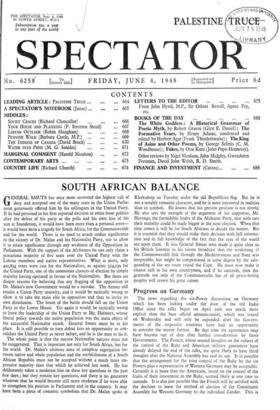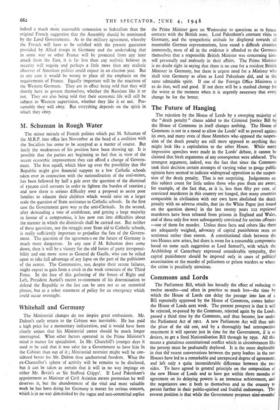Progress on Germany The news regarding the six-Power discussions on
Germany which has been leaking under the door of the old India Office since the talks began on April 20th was much more explicit than the bare official announcement, which was issued on Wednesday and will only be expanded after the Govern- ments of the respective countries have had an opportunity to consider the matter further. By that time the agreements may have become out of date after further consideration by those Governments. The French, whose second thoughts on the subject of the control of the Ruhr and American military guarantees have already delayed the end of the talks, are quite likely to have third thoughts after the National Assembly has said its say. It is possible that the arrangement for the joint control of the Ruhr by the six Powers plus a representative of Western Germany may be acceptable. Certainly it is more than the Americans, intent on the control of the fruits of their investment in the Ruhr, seemed likely at one time to concede. It is also just possible that the French will be satisfied with the decision to leave the method of election of the Constituent Assembly for Western Germany to the individual Lander. This is indeed a much more reasonable concession to federalism than the original French suggestion that the Assembly should be nominated by the Land Governments. As to the military agreement, whereby the French will have to be satisfied with the present guarantee provided by Allied troops in Germany and the undertaking that in some way or other France will be protected from any later attack from the East, it is far less than any realistic believer in security will require and perhaps a little more than any realistic observer of American politics could expect in an election year. But in any case it would be wrong to place all the emphasis on the requirements of France. Equally important will be the reactions of the Western Germans. They are in effect being told that they will shortly have to govern themselves, whether the Russians like it or not. They are also being told that their economic life will still be subject to Western supervision, whether they like it or not. Pre- sumably they will obey. But everything depends on the spirit in which they obey.



































